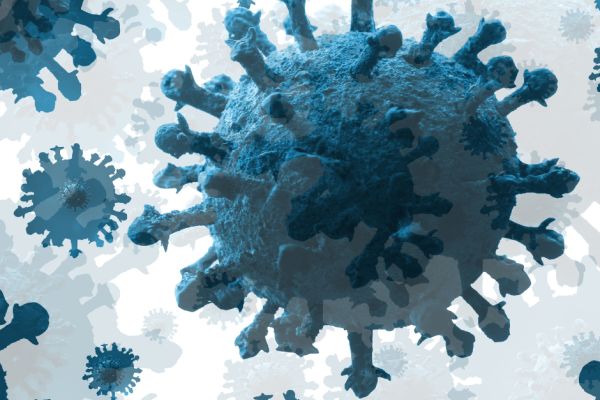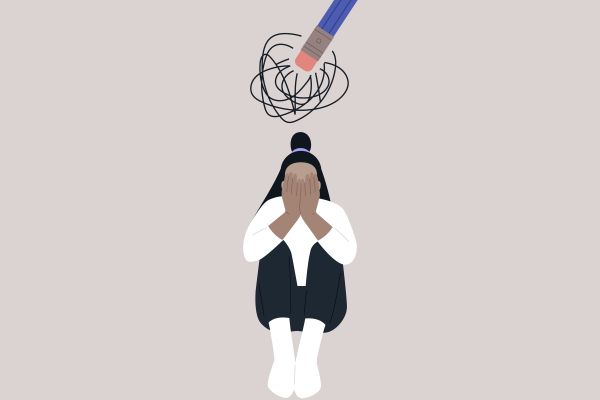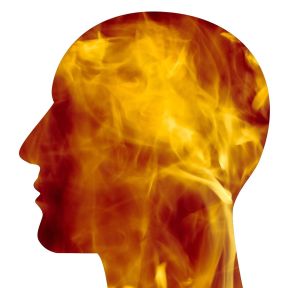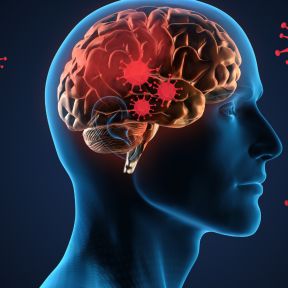
Long Covid
Long Covid is a designation created by patients early in the Covid-19 pandemic who found themselves experiencing a course of illness that was longer and more complex than their initial symptoms or than initial reports of acute respiratory infection suggested.
Most people infected with Covid-19 experience a mild to moderate acute infection; fewer than 10 percent develop hypoxemic pneumonia, while 3 percent develop a critical illness. Evidence indicates that more men than women get acute covid, and most people who get Covid recover completely in weeks.
However, some people experience a protracted bout of illness, relapse after an apparent recovery, or develop totally new symptoms—all now known as long Covid. The condition encompasses such an array of symptoms—persistent fatigue, brain fog, shortness of breath, vomiting and diarrhea, cardiac problems, neurologic anomalies—in a range from mild to debilitating, that no one is sure whether it is one condition or several. All evidence indicates that, around the world, more women than men experience long Covid, and most are middle-aged.
Much is unknown about the nature of the coronavirus and how it behaves in the human body. While it was early described as a respiratory virus, it has also proved to have an affinity for cardiovascular, neural, gastrointestinal, and other tissue, affecting many systems of the body, and sometimes overactivating the immune system. It even affects cholesterol metabolism and has been reported to impair erectile function. At the latest count, more than 200 symptoms have been associated with coronavirus infection, especially long Covid, which ranges from mild to completely debilitating.
Fever, cognitive sluggishness, dry cough, joint pain, skin rashes, the advent of new allergies, swollen and discolored toes, constipation, and shortness of breath—all have been reported in patients for weeks or months after experiencing acute Covid infection. Extreme fatigue, cognitive dysfunction, and memory loss are among the most common symptoms of long Covid, and they are also the most long-lasting.
Patients with long Covid typically report that their symptoms not only affect multiple organs but wax and wane over weeks and months. Exercise, stress, or any physical or mental exertion (post-exertional malaise, or PEM) can trigger a relapse. Many find that they are unable to maintain the work schedule they had pre-Covid, and a significant number of people report they are unable to work at all. Many healthcare experts believe that a disability crisis affecting millions in the U.S. and globally will follow the pandemic and strain resources for years.
Many symptoms have been associated with long Covid, and patients typically experience multiple symptoms. The most common are:
• Fatigue
• “Brain fog”
• Headache
• Neuropathy
• Sleep problems
• Loss of smell/taste
• Memory disturbances
• Chest pain
• Heart palpitations
• Shortness of breath
• Anxiety
• Gastrointestinal disruption
• Difficulty swallowing.
In one survey of more than 3,500 people with long Covid, more than 85 percent experienced systemic problems affecting musculoskeletal, cardiovascular, gastrointestinal, pulmonary, and neuropsychiatric systems. The symptoms patients consistently find most debilitating are fatigue, breathing issues, and cognitive dysfunction.
Long Covid is defined by the U.S. Centers for Disease Control and Prevention as the presence of Covid-related symptoms more than four weeks after an acute infection. They may be continuing symptoms, symptoms returning after a remission, or symptoms newly arising.
More than 200 symptoms have been linked to long Covid. Not everyone gets all of them or the same combination of symptoms, or to the same degree. Patients report that clusters of symptoms change over the course of long Covid.
“Brain fog” is an informal term people use to describe the inability to think clearly; people feel mentally sluggish and find their thinking fuzzy. Brain fog is a common feature of both acute Covid infection and long Covid. It encompasses any of a number of mental functions, from poor concentration and inability to sustain attention to difficulties in problem-solving and decision making and outright confusion. The brain fog experienced by Long Covid patients typically includes memory impairment, involving both short-term and long-term memory loss. Sufferers may even have trouble remembering how to do routine tasks.
Patient surveys have found that brain fog is one of the earliest symptoms of long Covid and the cognitive dysfunction increases over the early months of the disorder before easing months later. It is a primary reason many long Covid patients find themselves unable to work.
There are many possible causes of brain fog, a condition known to occur with other infections, such as the flu. Inflammatory factors are typically produced by the body and mobilized in the early stages of an infection in a natural attempt to contain it, and those substances travel through the bloodstream to many parts of the body, including the brain, where they can disrupt normal operations. The passage of inflammatory factors to the brain has been identified as a mechanism behind depression, for example.
It’s also possible that the virus causes damage to blood vessels and impairs the delivery of oxygen to organs, including the brain. The brain normally consumes a disproportionate share of body oxygen, and brain fog may result when it is in short supply.
But investigators are examining whether there is some distinctive way the coronavirus affects the brain to impair its functions.
According to the CDC, those most at risk for long Covid are those who had the most severe Covid-19 illnesses, and especially those who were hospitalized with the condition, required intensive care, or were intubated in an effort to overcome breathing problems. Another group at high risk are those who had underlying health conditions prior to getting Covid-19.
But enigmatically, there is evidence that even people who had asymptomatic Covid or mild Covid—or didn’t even realize they had Covid—can get long Covid. In a major study of more than 78.000 people with long Covid, reported in May 2022, 60 percent of whom were female and 40 percent male; 75.8 percent had not been hospitalized for their acute Covid-19 illness.
Most were experiencing symptoms four and a half months after their initial infection. A third of the total had no preexisting medical conditions. Long Covid was most common in women between ages 36 and 50, and shortness of breath, cough, and malaise/fatigue were the most common complaints. Muscle problems, pulmonary embolism, and brain-related conditions occurred, the researchers found, “with unusual frequency.”
There’s some evidence that the presence of anosmia (loss of smell) in women with mild acute Covid may be predictive of the development of long Covid. It’s possible, researchers suggest, that the post-Covid syndrome can be caused by autoimmune damage to neurons, glia, and cerebral blood vessels.
What studies also show is that vaccination against Covid halves the risk of long Covid. Vaccination reduces long Covid’s incidence by preventing people from getting infected in the first place.
You can get long Covid if you are vaccinated, but your chances of getting it may be far lower—less than half, according to one study, but only 15 percent lower in another—than if you are unvaccinated. Vaccination reduces the chances of getting long Covid by reducing the chances of getting infected with Covid at all. There’s also evidence that vaccination is far less likely to lead to the production of such misguided immune warriors as autoantibodies, should Covid strike. Yet brain fog and fatigue have been found to occur with equal frequency in long Covid patients whether they had been vaccinated or not.
Long Covid is most common among those of middle age, especially women. It’s not clear why, but women between the ages of 40 and 50 have double the risk of long Covid than men of the same age. The gender disparity in susceptibility disappears by age 70.
Because long Covid is likely not one single syndrome, different studies have identified different populations of people at risk. A large-scale study of primary health care records in the U.K. indicates that pre-existing poor mental health raises the risk of long covid by 50 percent. The same study showed that asthma raises the risk by 32 percent.
Other data indicates that people who experience more than five symptoms with acute Covid infection are most susceptible to long Covid than are those with fewer early symptoms. The amount of virus detectable in a person during an acute infection—viral load—also correlates with the development of persistent Covid, but researchers are not sure whether measures of high viral load reflect exposure to a large dose of virus or lack of effective response to the virus.
It is not yet clear what the long-term effects of Covid infection are beyond long Covid. The immune defense against coronavirus infection may be inadequate, allowing the virus to damage organs lastingly. The immune response can also be overzealous, creating another pathway for lasting damage at the site of infection and triggering changes elsewhere in the body. Bits of the virus may linger in body cells setting off ongoing inflammation, a process meant to kill germs but which, if prolonged, consumes energy, induces fatigue, and damages body tissue. There’s some evidence that protein substances produced by wayward coronavirus can specifically disrupt the body’s circadian clock, leading to sleep problems.
Numerous studies show that Covid is most transmissible in the first week to 10 days of an acute infection. Attempts to culture virus collected from infected people show that it is not capable of replicating itself after day 9, even if the patients still have high levels of the virus. The symptoms of long Covid are believed to reflect not the direct action of the virus itself but the body’s response to that virus. It is probably safe to assume that those with long Covid cannot pass the virus to others; it is also the case that the last word has not yet been written on how long people remain infectious.
The duration of long Covid varies from patient to patient. In one survey of several thousand patients, the majority had symptoms lasting more than 6 months—regardless of whether they tested positive or negative for Covid.
In a study conducted in Luxembourg of people who had tested positive for Covid-19, 60 percent had at least one symptom a year later. A third had fatigue, 13 percent had breathing problems, and 54 percent had sleep problems.
It is too soon to say whether long Covid can become a chronic health condition for some people; Covid was only first detected and named in December 2019, Covid cases were not reported outside China before 2020, and long Covid was only first emerging in May 2020. Although many patients with long Covid experience symptoms for six months or a year, several reports suggest that the condition may resolve gradually over time.
Nevertheless, long Covid can precipitate tissue damage that is permanent. For example, long Covid is sometimes marked by the formation of tiny blood clots. The clots can cause organ damage—to the lungs, to the heart, to the kidneys, to the brain—that may be permanent. Also, it appears that long Covid can stimulate antibodies that mistakenly attack the body’s own tissues—autoantibodies—triggering an enduring autoimmune condition.
In February 2020, as Covid-19 began spreading around the world, after being discovered in China in December 2019, the World Health Organization reported that patients with mild cases recover in about 2 weeks and those with severe or critical disease recover in 3 to 6 weeks.
By May 2020, groups of Covid patients who had found each other on the Internet reported ongoing, cycling, or worsening symptoms months after their initial illness. They experienced cognitive impairment, memory loss, deep fatigue and general malaise, shortness of breath, dizziness, insomnia, recurring chills and sweats, appetite loss, and difficulty functioning. Cardiac, respiratory, musculoskeletal, and neurologic symptoms, such as persistent loss of smell, were added to the list.
In October 2021, the WHO, acknowledging the lack of clarity about long Covid, released a “clinical case definition” of long Covid, an official set of criteria that public health professionals use to determine whether a person has the condition. According to WHO, long Covid generally occurs three months from the onset of probable or confirmed Covid-19 and lasts at least two months.
In mid-April 2022, a meta-analysis of 31 studies published in The Journal of Infectious Diseases revealed that 49 percent of Covid-19 survivors reported persistent symptoms four months after diagnosis. The true prevalence is still unknown.
Starting in June of 2022 , however, the percentage of people in the U.S. experiencing long Covid after a bout of infection began declining, according to data published by the CDC. At that time, more than 3 percent of U.S. adults reported having long Covid, while 7 percent reported ever having the condition.
Rates of long Covid appear to vary around the world. Some studies show that 30 percent of Americans who get Covid experience long Covid. But a massive study—of 4.5 million patients treated at U.S. Veterans Administration hospitals—tallies a rate of 7 percent. Even people with asymptomatic Covid can later manifest long Covid, as can those who previously tested negative on antigen or antibody tests.
It is not yet clear what the true prevalence of long Covid is because the symptoms are so diffuse and studies so far have employed differing criteria and time frames of observation. Estimates range from 10 percent to more than 60 percent of those who get acute Covid. When WHO offered a definition of the condition in December 2021, it reported that “most people who develop Covid-19 fully recover, but current evidence suggests approximately 10 percent to 20 percent of people experience a variety of mid- and long-term effects after they recover from their initial illness.”
According to subsequent analyses of several databases of Covid patients, including those with mild or asymptomatic acute infection, a post-Covid syndrome reportedly develops on average in 30 percent to 60 percent of patients—mainly women. Fatigue, shortness of breath, cough, and loss of sense of smell are among the most common symptoms.
In February 2022, an editorial in the journal Nature observed that two years into the pandemic, there had been about 400 million confirmed cases of Covid worldwide and many more undocumented. On the basis of available prevalence rates established, it said, about 100 million people were likely suffering from long Covid.
Because long Covid is such a mysterious condition, with symptoms that may shift in nature and intensity, it is extremely difficult to diagnose definitively. In fact, it is a diagnosis made by exclusion, conferred only after no other causes can be found for the highly variable symptoms.
A history of acute Covid infection—however mild—weeks or months earlier is a key indicator. Not only is there an array of nonspecific symptoms, but most of them could also arise from any number of health problems. Further, many of the symptoms—fatigue, headache, difficulty concentrating—also occur among people who are perfectly well.
It’s the very vagueness of symptoms, and their tendency to wax with exertion of any kind, that is highly suggestive. Timing is an important clue, too: The symptoms arise in the wake of acute Covid infection—although the acute infection may have been so mild or so many months earlier that a connection is not immediately apparent.
It is sometimes hard to know whether you have long Covid. The common symptoms—fatigue, headache, difficulty concentrating—are generally vague in nature, not specific to any disorder, and frequently occur among people who have no disorder. The vagueness of symptoms combined with their tendency to worsen with exertion should raise suspicion, especially if a Covid infection occurred weeks or months earlier or there is a loss of sense of smell.
There is no definitive test or treatment for long Covid. It is entirely possible to experience long Covid without ever having tested positive for the virus or knowing one was infected. Moreover, the wide variety of symptoms could suggest many other possible causes. Nevertheless, if you have a number of unexplained symptoms more than four weeks after an initial infection, consider the possibility of long Covid and plan to see a medical provider.
Although standard blood and other tests may show no abnormalities, they could indicate the presence of conditions that require treatment.
A history of your symptoms can be the most important tool in diagnosis. The CDC recommends that, when visiting a medical provider, you prepare a history that summarizes:
• when you got an initial Covid infection or tested positive for it
• a list of any diagnostic tests you may have had related to your symptoms
• a list of any medications you may be taking for them
• the frequency of symptoms
• observations of what makes symptoms worse.
Careful tracking of symptoms can alert you to possible dangers.
Healthcare providers may only be able to offer symptom relief. But they are increasingly aware of and often serve as conduits to studies tracking patients with long Covid. While such studies are usually designed to generate insights into the origin and prevention of such conditions in the future, they also may unearth immediately useful information about managing or treating long Covid symptoms.
There is no single test for long Covid. However, new information about Covid and long Covid is emerging daily, and as information spreads through the medical community, physicians may add diagnostic measures that could help them rule out or rule in the condition. For example, physicians who suspect long Covid may order an array of blood tests for levels of various immune factors, including levels of antibodies against the Epstein-Barr virus; there’s mounting evidence a re-activated virus can cause long Covid. (It’s also implicated in myalgic encephalitis/chronic fatigue syndrome.)
Because there are no specific tests for long Covid, the condition can arise from asymptomatic acute infections, and symptoms can be vague and amorphous, diagnosis is difficult and typically made by testing for and ruling out other conditions. Of course, a history of acute Covid infection is highly suggestive.
Although researchers are exploring the possibility that some immune factors may be emblematic of long Covid and can therefore serve as diagnostic signposts of the condition, a blood or other test for long Covid is still a long way off. For now, doctors rely on their patients’ descriptions of symptoms and rule out alternative explanations or causes. Some medical facilities have created post-Covid clinics where teams of specialists from multiple medical disciplines evaluate patients and figure out treatment possibilities.
In general, physicians rely on a battery of tests to assess the overall health of patients suspected of having long Covid. Likely included are a complete blood count, measures of electrolytes and metabolic factors, tests of liver function and cardiac function, and measures of substances involved in blood clotting.
One of the many mysteries of Covid is that long Covid can develop in patients who had a mild acute infection, or asymptomatic infection—or in those who didn’t know they had Covid at all.
It is not yet clear what causes long Covid, and it is possible that a post-infectious condition can arise in more than one way. Most experts believe that long Covid is not itself an infectious disorder.
It may be that, during the acute phase of the infection, the virus causes tissue damage that snowballs and reaches clinical significance later. Scientists in several laboratories around the world have found that pieces of the coronavirus—they’ve been called “coronavirus ghosts”—can linger in the gut (and heart, eyes, and brain) for months after acute infection, continuing to cause organ damage and symptoms arising from that damage.
The viral pieces may also stimulate an ongoing inflammatory response. An acute inflammatory response is one of the body’s natural defenses. But if an inflammatory reaction is prolonged for any reason, it itself becomes tissue-destructive, and inflammatory substances can set off a wide range of symptoms in many parts of the body and brain.
In November 2023, researchers reported that the symptoms of long Covid may arise from a decline in levels of the neurotransmitter serotonin, caused by a persistence of the virus in the gut. Studies of both humans and animals suggests that reservoirs of the virus may linger in the gut, causing inflammation, which in turn prevents absorption of the amino acid tryptophan, the precursor of serotonin.
According to the researchers, "Serotonin activity supports vagus nerve function, among other roles. In the study, serotonin loss was associated with lower nerve activity. Dysfunction in the vagus nerve was linked with characteristic long COVID symptoms such as memory loss and hippocampal dysfunction."
There are many facets of the immune system, and differing patterns of immune dysregulation triggered by the coronavirus could underlie the differing symptoms seen in long Covid. Some researchers contend that the production of autoantibodies—antibodies that mistakenly attack body tissue and produce conditions such as rheumatoid arthritis and lupus—is a hallmark of long Covid.
The virus may infiltrate and “hide out” in immune cells in many body systems. And then reactivate. Or the hidden virus could trigger an immune response that then causes inflammation and damage to many parts of the body. Or it could reactivate other dormant viruses from long-ago infections, notably the Epstein-Barr virus, which causes mononucleosis.
The virus is also known to infect the lining of blood vessels and could set off a cascade of events accounting for the widespread nature of symptoms. There’s evidence the virus alters the epithelial cells lining blood vessels and affects how they function, triggering tiny blood clots anywhere in the body and even disturbing cholesterol balance. The formation of blood clots can disrupt the blood supply to various organs, including to the heart.
Under what conditions coronavirus infects or persists in body tissue, stimulates an overzealous inflammatory immune response, triggers tiny blood clots in various organs, or otherwise generates a distinctive chronic disorder is under active investigation by networks of researchers around the world.
Long Covid is believed to be not one condition but multiple conditions affecting different systems of the body in different people in response to acute infection with the coronavirus. Long Covid can shrink brain tissue; MRI studies of patients before and after Covid infection show a decrease in gray matter in areas of the cerebral cortex that encode memory and control emotions. Long Covid can damage lung tissue and heart tissue. It can overactivate immune responses and create inflammation system-wide. There’s evidence it can reactivate dormant viruses, such as the Epstein-Barr virus, which causes mononucleosis.
Some of the symptoms of long Covid can result from abnormal blood clotting in response to Covid infection. The effect may be tiny strokes that can block blood vessels in the heart, lungs, liver, kidneys, or legs.
While most people with long Covid seem to recover over months to years, some people experience lasting damage to organs as a result of direct damage to cells, lack of oxygen caused by tiny blood clots, inflammatory damage, or other means. They may suffer long-lasting breathing problems as a result of scarring of lung tissue. Others have heart complications as a result of ongoing inflammation. Chronic kidney disease is another possible consequence doctors have reported, as is stroke.
Children can get long Covid, but the condition generally spares the young and the old. It is most common among those between the ages of 35 and 50. Nevertheless, some studies indicate that about 10 percent of children who test positive for Covid still have symptoms after 5 weeks.
When children do get long Covid, the signs may be struggles to keep up with schoolwork or sports—consequences of the brain fog and fatigue that adults also report. But a few children develop Multisystem Inflammatory Syndrome (MIS-C), marked especially by high fever, low blood pressure, skin rash, diarrhea, red eyes, cough, and swollen hands or feet. It involves inflammation of multiple internal organ systems and is thought to reflect a delayed, overzealous immune response to coronavirus infection. The condition generally requires hospitalization with intensive care and monitoring of the heart, liver, and other organs.
It is, essentially, not yet clear exactly what kind of disorder long Covid is. Dysregulation of the immune response by coronavirus is known to play a role in causing some of the serious complications of acute Covid—the so-called cytokine storm is one. There’s evidence that an immune response dysregulated in any number of other ways—and the production of tissue-destructive autoantibodies is one—is involved in long Covid. But the immune response is multifaceted and highly complex, and there are many ways it can go off track. While autoantibodies have definitely been detected in large numbers of long Covid patients, other mechanisms may play a role, too. That said, there are some groups off researchers who believe that the frequency with which they find autoantibodies in long Covid patients makes it an autoimmune disease.
While “long Covid” is the popular name for the condition that occurs in the wake of coronavirus infection, it is also formally called “post-acute coronavirus syndrome.” As the medical name suggests, constellations of symptoms are known to arise in the wake of other virus infections, and they are often similarly vague, variable, and notoriously difficult to pin down.
Chronic fatigue syndrome, called myalgic encephalomyelitis/chronic fatigue syndrome, is one such disorder; its cause is not well understood but in a majority of cases it appears to develop after a viral infection, notably with Epstein-Barr virus. The symptoms of ME/CFS eerily resemble those of long Covid—disabling fatigue, sleep problems, post-exertional malaise, brain fog, and generalized pain. Both conditions are also most likely to occur in women of middle age. Some researchers believe that the shared symptoms of ME/CFS and long Covid reflect a similar cause—a biological response to infection that goes awry for some as-yet-unknown reason.
Because no one knows exactly what long Covid is—and it appears to be an assortment of conditions, not one—the best treatments currently available address specific symptoms. For example, a behavioral treatment, olfactory training, is often prescribed for those who have lost their sense of smell. It not only restores olfactory capability but is thought to bolster other functions of the brain. Physical therapy may be prescribed for those who have dizziness, shortness of breath, fatigue, or muscle weakness. The current goal of most treatments is to restore function and return patients to a high quality of life.
Increasingly, major medical institutions are opening treatment centers that specifically focus on people with long Covid. Most such centers pull together specialists from multiple disciplines to address problems holistically.
There is no cure for long Covid because physicians are not sure what causes long Covid. There are, however, treatments for some of the symptoms. One of the most important treatments for long Covid is targeted at those who have lost a sense of smell. Studies show that one effect of Covid is to downregulate olfactory receptors. The treatment is a behavioral program of olfactory training, involving exposure to sets of odors twice a day and connecting the smell with a memory of that odor. A dampened sense of smell seems to be linked to lasting changes to the brain; it is thought that the lack of sensory input causes the brain's olfactory center to atrophy. The treatment, clinicians say, is important because beefing up the smell areas of the brain also affects the brain centers of memory and emotion regulation, to which they are connected.
Clinicians experienced in treating long Covid patients also emphasize the importance of maintaining blood volume through salt intake and adequate hydration. In addition, they recommend engaging in movement, starting with recumbent exercise.
The course of long Covid can be highly variable. As physicians gain experience with long Covid, they note that it generally tends to resolve slowly over time. Fatigue on exertion seems to be one of the last symptoms to resolve.
One way to speed recovery, ironically, is to allow time for recovery. People who exert themselves too quickly are likely to experience a flare-up of symptoms. Better to increase activities gradually.
Exercise is also important for maintaining muscle capacity and relieving muscle and joint pain. Otherwise, deconditioning occurs, making even necessary movement taxing. Because cardiovascular exercise may be particularly difficult at first, experts recommend beginning exercise with mild resistance activities.
Maintaining hydration—even in the absence of thirst— is important for recovery in general. There’s evidence that suboptimal hydration, especially of the nose and throat, is a risk factor for Covid in the first place and worsens symptoms that do occur; it may usher the virus deeper into the lungs. Fever, a marker of inflammation, is a known risk factor for dehydration. Particularly in older patients, dehydration is associated with loss of cognitive function. What’s more, dehydration burdens breathing and is a barrier to blood oxygenation by thickening lung secretions.
Studies indicate that about a third of patients experience loss of the sense of smell. Olfactory training is recommended not only to restore the sense of smell but to ensure the maintenance of such brain functions as memory and emotion regulation. Olfactory training involves programmed, twice-daily exposure to sets of smells while connecting each smell to a memory of that smell.
The evidence so far is mixed, but some centers report that long Covid patients experience improvement in their symptoms after getting a dose of the vaccine. The shot may be fortifying their weakened immune system.
According to the U.S. Department of Health and Human Services, long Covid qualifies as a disability under the Americans with Disabilities Act if it substantially limits one or more major life activities. The disability can be a physical or mental impairment that substantially limits one or more of the major life activities of an individual.
There are currently no evidence-based drug treatments for long Covid, but manufacturers are exploring possibilities. There are anecdotal reports that over-the-counter antihistamines relieve some symptoms, such as fatigue and brain fog. Since there seem to be many mechanisms behind the array of symptoms known as long Covid, there may not be any one drug treatment that works for everyone. That is not stopping pharmaceutical companies from searching.
One drug now being tested targets lung complications of Covid. Another drug by a different manufacturer is being tested on a small group of patients to see whether it relieves the fatigue associated with long Covid; it targets the mitochondria to increase energy for muscle function. Another drug being tested on a small group of patients is an agent aimed at reducing Multi-Inflammatory Syndrome in Children (MIS-C) by dampening the autoimmune response. A fourth agent under study is a dietary supplement believed to restore all-around functionality by providing general immune support.
With so little known about the precise causes of long Covid, it’s premature to provide directives for preventing the condition. Still, some information is emerging.
The best-known prevention for long Covid is thought to be a vaccination against Covid. Several studies show that vaccination lowers the risk of long Covid, although by how much is not clear—it varies from 15 percent to 50 percent, depending on the study. Some researchers contend that the risk of long Covid is mitigated primarily because vaccination curbs the risk of acute Covid infection in the first place.
But there’s also evidence that vaccination reduces the likelihood of lung problems and minimizes the risk of blood-clotting problems, sources of extended damage. Further, reports suggest that vaccination prevents the production of autoantibodies in response to Covid infection, tissue-destroying immune cells implicated as a possible cause of long Covid.
It may be that antiviral vaccination in general—even against the common flu—may act as a preventive, at least for a period of unknown duration, because it provides a general boost to the immune defense system. It is known that some long Covid patients experience improvement in their symptoms after getting a dose of the coronavirus vaccine. The shot may be fortifying an immune system that failed to mount an adequate response to coronavirus infection, paving the way for long Covid.
Suboptimal hydration, especially of the nose and throat, appears to be an important risk factor for acute Covid infection. What’s more, it worsens symptoms that do occur. Researchers find that inadequate hydration enables the coronavirus to travel deep into the lungs and damage small airways. In addition, dehydration thickens lung secretions, making breathing difficult and impeding blood oxygenation. Tissue damage resulting from inadequate tissue oxygenation is thought to be a source of the diverse health problems linked to long Covid.
Uncertainty about the degree of protection against long Covid provided by vaccines, researchers and clinicians say, highlights the importance of basic infection-containment measures such as mask-wearing and social distancing. Such measures are especially important for those with a compromised immune system.
References
Callard, F., & Perego, E. (2021). How and why patients made Long Covid. Social science & medicine (1982), 268, 113426. https://doi.org/10.1016/j.socscimed.2020.113426














